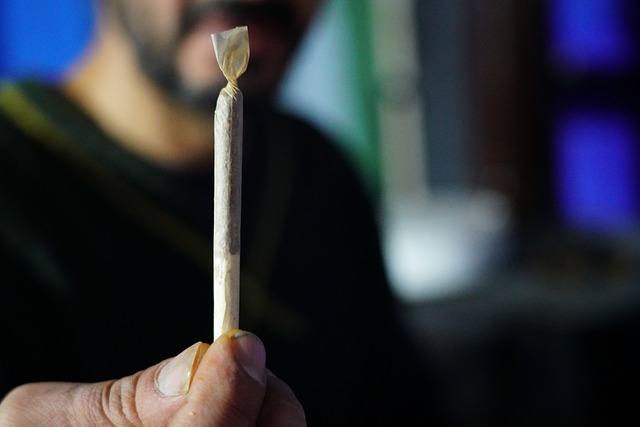Texas residents considering THCA flower must be well-versed in its potential benefits and side effects given its non-psychoactive nature and increased accessibility after the 2018 Farm Bill. While hemp-derived THCA with less than 0.3% THC is legal in Texas, the status of cannabis-derived THCA remains illegal due to state regulations. Key side effects of THCA, such as drowsiness, dry mouth, and blood pressure changes, can be managed by adjusting dosage or exploring different consumption methods. It's essential for individuals to start with low doses due to varying individual responses to THCA. Additionally, users should be aware that THCA can convert into THC when heated, which may lead to psychoactive effects. The legality of THCA products in Texas hinges on their hemp versus cannabis origin, with stricter regulations applied to those derived from cannabis. As legal standards evolve, Texas consumers must remain informed and discerning about the sources of their THCA products to ensure they are within the bounds of state and federal laws. This understanding is crucial for safely and responsibly incorporating THCA into a health regimen while navigating its complex legalities in Texas.
Exploring the effects of THCA flower, a non-psychoactive cannabinoid, has garnered attention among Texans intrigued by its potential wellness benefits. This article delves into the side effects associated with THCA consumption, offering insights for those curious about its legal status in Texas and the implications for safe usage. Understanding the nuances of THCA’s legality within the state’s regulatory framework is crucial for anyone considering incorporating it into their wellness routine. Join us as we navigate the complexities surrounding THCA’s legal standing in Texas and its impact on safety and side effects.
- Understanding THCA Flower Side Effects: A Comprehensive Overview for Texans
- Navigating THCA Legality in Texas and Its Implications on Consumption Safety
Understanding THCA Flower Side Effects: A Comprehensive Overview for Texans

Understanding THCA flower side effects is crucial for Texans considering its use, given that THCA (Tetrahydrocannabinolic Acid) is a non-psychoactive compound found in hemp and cannabis plants. With the legal status of hemp-derived products containing less than 0.3% THC clarified under the 2018 Farm Bill, and Texas’ own laws allowing for the sale and use of such products, THCA has garnered attention for its potential therapeutic benefits. However, as with any substance, it is imperative to be aware of its side effects. THCA legal in Texas has opened avenues for research and personal exploration, but users should approach it with caution. Common side effects may include drowsiness, dry mouth, and lowered blood pressure. These can typically be managed by adjusting dosage and consumption methods. It is also worth noting that individual reactions can vary significantly; thus, those new to THCA are advised to start with small amounts to gauge their body’s response. Additionally, while THCA itself is non-psychoactive, it can convert to THC in a process called decarboxylation when heated, which may induce psychoactive effects. Understanding the nuances of THCA flower and its potential impact on the body is essential for Texans looking to incorporate it into their wellness routines, ensuring a safe and informed experience within the legal framework established by state and federal regulations.
Navigating THCA Legality in Texas and Its Implications on Consumption Safety

Navigating the legality of THCA, or tetrahydrocannabinolic acid, a non-psychoactive precursor to THC found in cannabis and hemp, can be complex, especially in states like Texas. As of the knowledge cutoff date, certain forms of hemp-derived CBD with less than 0.3% THC are legal under the 2018 Farm Bill and corresponding state laws. However, the specific status of THCA is less clear, as it falls into a gray area where its legality hinges on the distinction between hemp and cannabis-derived products. In Texas, the cultivation, possession, and sale of cannabis remain illegal under both state and federal law, which means that THCA derived from cannabis is not legal. Conversely, THCA found in hemp is more leniently regulated, provided it adheres to the aforementioned THC concentration limits. It’s crucial for consumers in Texas to be discerning about the source of their THCA products and to stay updated on evolving legislation, as state laws can change and may impact access and safety. Consumption safety is paramount, given that THCA, while not psychoactive, interacts with the body’s endocannabinoid system and can have physiological effects. Users should approach its consumption with caution, particularly if they are sensitive to cannabinoids or under the care of a healthcare provider. Understanding the nuances of THCA’s legal status in Texas is essential for anyone considering its use, as it directly affects one’s ability to legally access and safely consume these products.
In summary, the consumption of THCA flower in Texas carries specific side effects that users should be aware of. The legal status of THCA in Texas, which has been a point of clarification, underscores the importance of understanding its implications for safety and well-being. As outlined in this article, individuals considering THCA flower must approach it with careful consideration due to its distinct properties compared to other cannabinoids. It is advisable to adhere to recommended dosages and consume responsibly, as overindulgence can lead to side effects ranging from mild to severe. For Texans seeking to explore the potential benefits of THCA, staying informed on both its legal standing and health effects is paramount. With the right knowledge and cautious use, consumers can navigate this emerging landscape with greater confidence and safety.
